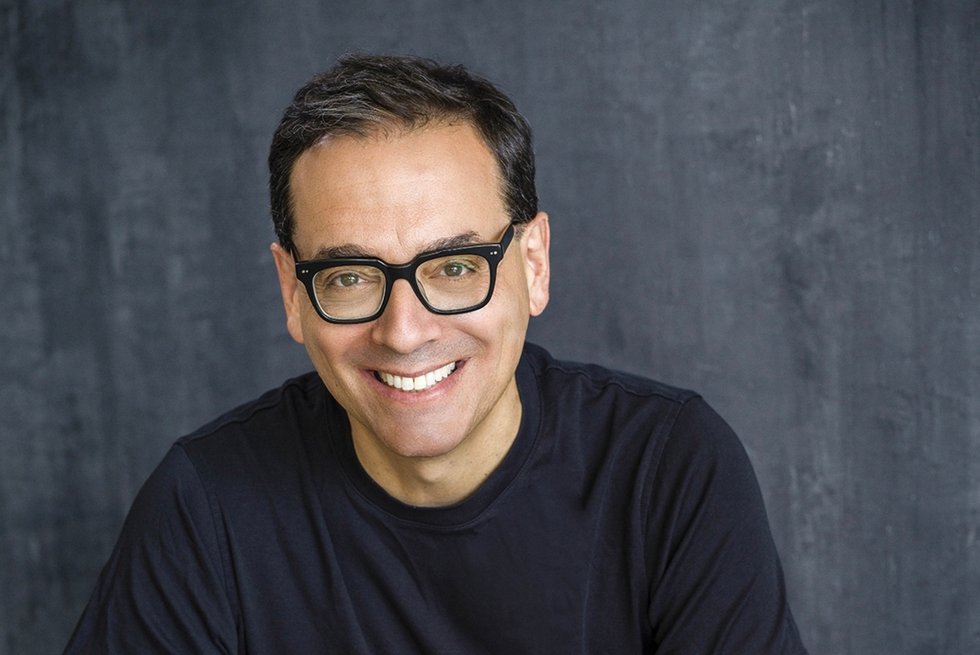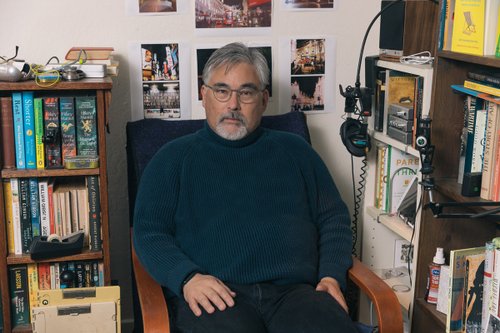Why having regrets is healthy... and powerful
28. 6. 2023
8 min.


Toronto expat and Paris-based journalist
If you’ve been beating yourself up about refusing a role at a shaky startup, quitting your job prematurely, or stealing a colleague’s idea, it might be time for a rethink. Bestselling author Daniel Pink, whose books include Drive and To Sell is Human, says that tapping into your regrets is the key to moving forward in all areas of your life, including at work.
The first indication that Daniel Pink is about to turn our idea of regret on its head is in the opening pages of his book The Power of Regret: How Looking Backward Moves us Forward. He slams one of France’s most beloved songs, Non, Je ne regrette rien (No, I have no regrets), which was first performed by one of the country’s most beloved singers in the 1960s. The rousing ballad sung by Édith Piaf would go on to become a life motto for many people around the world — think of the many tattoos, epitaphs and eulogies that proudly proclaim that lives were lived with “no regrets.” But that is “bulls*,” Pink says bluntly in his book. “Regret is not dangerous or abnormal, a deviation from the steady path to happiness. It is healthy and universal, an integral part of being human,” he writes. “Regret is also valuable. It clarifies. It instructs. Done right, it needn’t drag us down, it can lift us up.” Regret makes us human, he adds.
In The Power of Regret, Pink makes a compelling case for confronting our regrets and embracing them head on rather than running from or simply dwelling destructively on them. Along with studying 50 years of research on the emotion, he conducted his own surveys, one in the US, and another worldwide. The data was collected anonymously and it seems that the idea of freely expressing our regrets struck a chord: more than 24,000 people from 110 countries have filled out the World Regret Survey so far.
Pink breaks down the nature of human regret into four categories: foundation (education, finance, health); boldness (the chances we did and didn’t take); moral (good versus bad life decisions); and connection (relationships). Many of these also seep into workplace regrets: the choices we made early in our careers (foundation), the professional risks we took, or passed up (boldness), how we behaved in morally compromising situations (moral) and our professional relationships (connection).
We spoke to Pink about how his research relates to workplace regrets, why we need to reframe the way we look at regret, and why he says you should consider drawing up a “failure resume” – though you probably won’t want to share that one on LinkedIn.
This book puts regrets into four categories. Which ones do career regrets fall into the most and what were some of the most common such regrets you came across?
The four core regrets that you mention come from that third leg of the stool: the World Regret Survey. There I found that people’s regrets have less to do with the surface domains of life — careers, education, family, and so on — than with a deeper set of values and aspirations that lie beneath.
For example, one of the four categories is boldness. Here people reflect on a juncture in their lives when they could either have played it safe or taken the chance. When we don’t take the chance, we often regret it. Indeed, one of the sturdiest findings, in the existing research and in my own, is that we are much more likely to regret inactions than actions.
This is especially true with careers. Among the most common boldness regrets are regrets like these: “I didn’t have the guts to leave my lackluster job even though I always wanted to start a business. I didn’t pursue the profession that I deeply wanted to pursue but instead bowed to my family’s wishes and expectations. I was too timid to speak up at work and, as a consequence, watched my organization deteriorate.”
The survey highlights some demographic divides and trends, particularly when it came to the nature of regrets. Which group seemed to be more saddled with finance and career regrets?
To make solid demographic claims, I need to rely on the American Regret Project, which was a representative sample of more than 4,500 Americans. Here there were some interesting findings on the topic you’re asking about. For instance, people with the lowest incomes were the most likely to have financial regrets. [That’s] not surprising but [is] still revealing. Men were more likely than women to have career regrets, though not by a massive margin.
And perhaps most surprising, people with the most formal education were the most likely to have career regrets. That didn’t make intuitive sense to me, but upon reflection it does. After all, people with more education have more career options – and therefore perhaps more options to forgo.
The foundation regrets seem to be at odds with boldness regrets: I wish I had saved more/worked harder versus I wish I had enjoyed my youth/been more adventurous. Could this leave some readers confused and muddle our decision-making powers? How do we avoid paralysis and know if we’re making the right decisions?
I don’t think that foundation regrets and boldness regrets are antithetical — at least as the thousands of people in the World Regret Survey described them. Most of the foundation regrets were failures of conscientiousness, not excesses of risk-taking. A typical example: “I spent too much on frivolities and saved too little and now I’m broke.” Almost nobody expressed regret at losing money because they had started a business. Even people who started businesses that failed expressed regret about the decision far less than I expected. So, it’s possible to value both conscientiousness and learning and growth. In fact, I’d argue that both are essential to living a meaningful life.
As for how we know whether we’re making the right decisions, we don’t! At least we can’t know with any certainty. Good outcomes don’t always reflect good decisions. And bad outcomes don’t always reflect bad decisions. What we can do is evaluate the decision itself, the information we had at that moment, and the people we were at that point.
The book also reveals a few interesting trends when it comes to personality types. Why did your research show that introverts tend to have more regrets than extroverts?
The American Regret Project did not reveal massive differences between self- described introverts and self-described extroverts. But, as you say, there were a couple of very interesting differences in this dimension. First,_ _people were much more likely to regret being introverted or acting introverted than being or acting extroverted. This wasn’t even close. In fact, I don’t think there was a single person I encountered who regretted excesses of extroversion. What people did regret was not speaking up, not taking a chance, and not asserting oneself.
Second, as you say, regrets of inaction easily outnumbered regrets of action. And here there was a strong age effect. People in their 20s had about equal numbers of regrets about what they did and what they didn’t do. But for people just a little bit older, the inaction regrets took over. By our 50s, we tend to have about three times as many regrets of inaction versus regrets of action.
What does tapping into the power of regret look like in the workplace? How can it help us in our careers?
We have a rich body of research, particularly in social psychology, that shows that if we systematically confront our regrets — rather than ignoring them or wallowing in them — the benefits are huge._ Reckoning with our regrets properly can help us become better negotiators, avoid cognitive biases, solve problems faster and better, become better strategists, and find greater meaning in our work and lives.
One of the early points you make in the book is that many of us look at regret all wrong: that framing regret as a reflection of our character is destructive but that looking at regret as the product of a particular situation is instructive. Can you explain this concept for readers?
One of the things we know from lots of research on human flourishing is that it’s almost always better to evaluate the act rather than the actor. Evaluating our mistakes by concluding that we are a bad person or a stupid person or an untrustworthy person is usually destructive. It makes it feel as if improvement is impossible, because our disposition – our very being – is so flawed. We’re almost always better off evaluating the action, extracting a lesson from it, and applying that lesson to the future. Not “I’m an idiot,” but “I did a stupid thing. And I can learn from that stupidity, avoid it in the future, and apply those lessons to make better decisions.”
At what point can we blame this on context rather than character? Couldn’t this lead to piling on excuses for bad behavior? Is there a workplace example you can give?
That’s a crucial question. There’s a big distinction between regret and disappointment. Regret requires agency. It’s our fault. For instance, if it’s raining outside, I can’t regret that. I don’t control the weather. But I may be disappointed that I can’t play tennis. However, if I know it’s raining, and I don’t bother to bring an umbrella, then that’s on me. It’s my fault. And I can regret my choice.
This is even more important in the realm of careers and underscores why it’s so useful to scrutinize our regrets. For example, suppose I take a job at a startup and after a few years, the startup goes out of business. Do you regret the decision? Or are you merely disappointed in the outcome? To find out, examine the decision itself. When you were making that choice, did you ignore warning signs? Did you not do sufficient due diligence on the financial and the leadership? If so, that’s a regret – and you should extract lessons from them to apply to your future behavior.
On the other hand, sometimes things just don’t work out. Maybe the timing wasn’t quite right for this venture. Maybe conditions changed in the market unexpectedly. That’s context. It’s generally beyond our control. So, sure, you’re disappointed. But it’s not regret – and, therefore, it’s less instructive.
How can we maintain a healthy outlook and perspective on regrets, some of which may plague us and have a profound effect on our lives?
At the core is a three-step process. Think of it as inward, outward, forward. The first step is treating yourself with kindness rather than contempt, recognizing that regrets are part of the human condition, and understanding that any screw-up is a moment in your life, not the full measure of your life. We have 20 years of research on what’s called “self-compassion” – and it’s powerful.
The second step is to talk about your regret or even to write about it privately. That can be a form of unburdening. But equally important, when we convert a blobby, negative emotion into concrete words, the emotion becomes less menacing and easier to make sense of.
Finally, we need to move forward. That means taking a step back and systematically analyzing the regret to draw a lesson from it and then deploying that lesson to guide future behavior.
You offer some great advice on how to manage our regrets. What is your favorite tip for undoing any professional regrets?
My favorite is an idea from Tina Seelig at Stanford University. She calls it a “failure resume.” Instead of cataloging all of your accolades and accomplishments, a failure resume compiles your screw-ups, setbacks, and blunders. But it doesn’t stop there. You list your failures in one column. Then in the next column you list what lesson you learned from that failure. Then, in the third column, you list what you’re going to do about it. I’ve compiled a failure resume myself. It wasn’t fun – at all. But it was incredibly instructive.
Photo: Nina Subin
Follow Welcome to the Jungle on Facebook on LinkedIn and on Instagram and subscribe to our newsletter to get our latest articles every day!

Další inspirace: Inspirace & tipy

From hobby to side hustle: 10 steps to turn your passion into a career in 2025
Have you been waiting for the right moment to turn what you love into a paid gig? 2025 is your time!
18. 12. 2024

Patience, balance, and multitasking: How parenthood shaped my career
Parenthood changes everything—including your career. These working parents share exactly how.
11. 12. 2024

The traits of a great boss (and how they make your work life better)
What makes a great boss? Effective leaders do more than manage tasks—they create a workplace where people feel supported, encouraged, and inspired.
13. 11. 2024

Leading without limits: How to shine as a leader, title or no title
Lab expert Ginny Clarke explores how being a leader isn't just reserved for execs ...
09. 4. 2024

How our burnt-out society can finally get some rest
Alex Soojung-Kim Pang unveils transformative strategies for slowing down our fast-paced lives.
19. 3. 2024
Zpravodaj, který stojí za to
Chcete držet krok s nejnovějšími články? Dvakrát týdně můžete do své poštovní schránky dostávat zajímavé příběhy, nabídky na práce a další tipy.

Hledáte svou další pracovní příležitost?
Více než 200 000 kandidátů našlo práci s Welcome to the Jungle
Prozkoumat pracovní místa